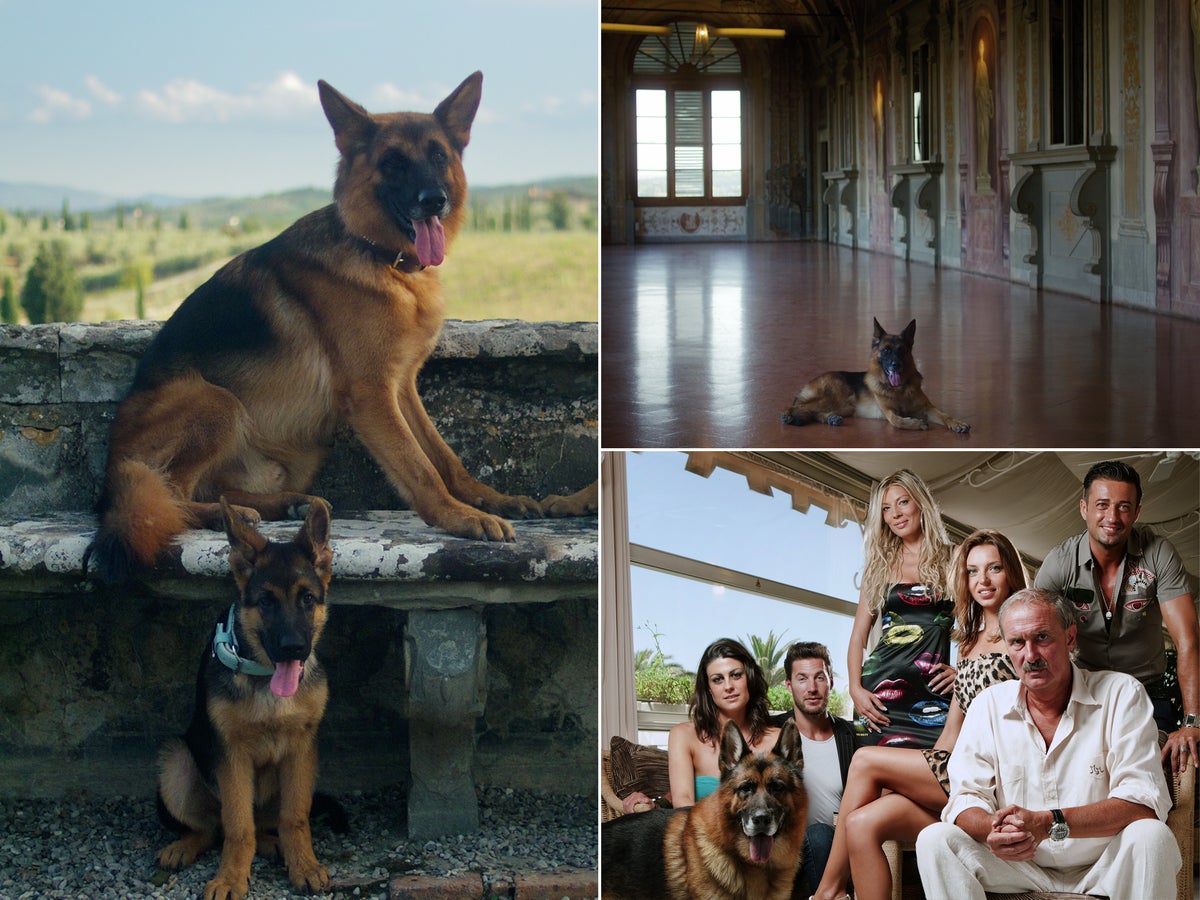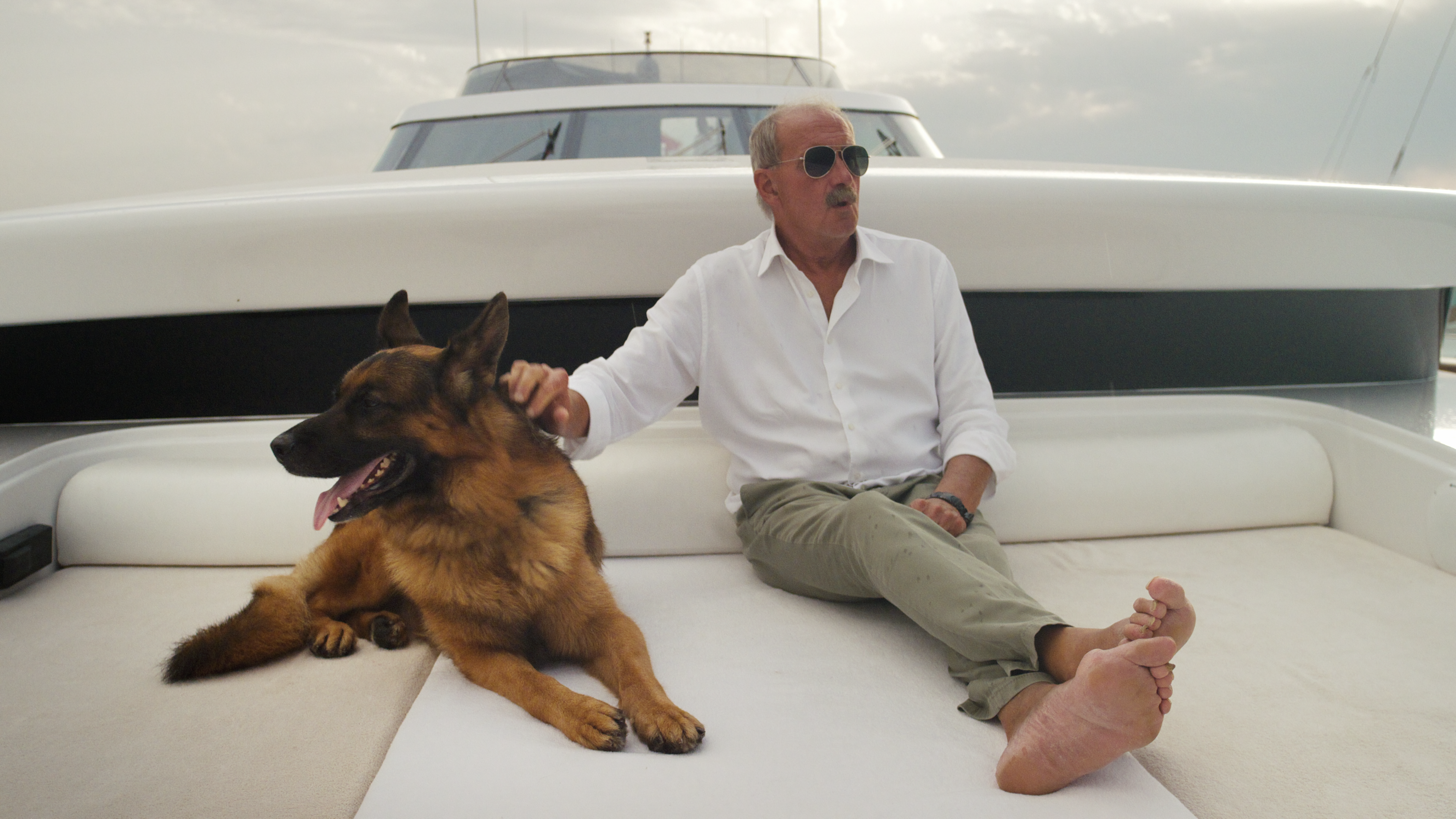
Once upon a time, Gunther was the wealthiest dog in the world. The German Shepherd was one in a long line of Gunthers. He was Gunther VI. His great-grandfather, Gunther III, had supposedly inherited a fortune from his late owner, a German countess.
In November 2021, Gunther VI made headlines when he allegedly tried to sell a Florida mansion previously owned by Madonna. The property was located in Biscayne Bay and went on the market at $31m. The Associated Press – in a story it later took down and replaced with a more accurate version – said the villa was just one element of Gunther’s extravagant lifestyle.
“A chef cooks his breakfast each morning made of the finest meat, fresh vegetables and rice,” that initial story read in part. “Sometimes he enjoys caviar, but there’s never any kibble in [sight]. He travels by private jet, works on obedience skills daily with his trainer and sleeps in a lavish round, red velvet bed overlooking the bay.”
Gunther had made appearances in the press before, but this time was different. Perhaps because it involved one of the most famous pop stars of our time and perfect for social media consumption. It seemed to attract more attention than previous mentions of Gunther, and more scrutiny. The New York Post ran a full debunking, stating that the real owner of the house was “not a dog”, but “a wealthy – albeit eccentric – 65-year-old Italian entrepreneur from Tuscany named Maurizio Mian.” The Associated Press replaced its story about the sale of the mansion with a new piece looking at “how the tale of a German shepherd and a trust has long been used as a publicity stunt to dupe reporters.”
“The AP fell for parts of the stunt and is removing the erroneous story,” the news service noted in its replacement.
The curious case of Gunther and his alleged fortune is the subject of a new Netflix documentary. Gunther’s Millions, billed by the streamer as its new Tiger King, is a zany, flamboyant, and exhaustive deep dive into the making – and unmaking – of Gunther’s legend. It is the result of two years of work, featuring multiple interviews with Mian as well as a wide cast of secondary characters. Director Aurelien Leturgie and executive producer Emilie Dumay, who are both French, didn’t come to the story knowing all its intricacies; rather, they uncovered them during the making of the documentary, both through interviews and by doing their own background research.
“The point from the beginning was to get the audience to live the journey we lived as filmmakers,” Dumay tells The Independent on a video call, the week before the documentary’s release. “We went into this feeling that this was a story about a dog who had all this money. We knew there were people pulling strings, and I think the audience would expect that, but every time there was a twist or turn, we were taken for a ride.”
To a degree, the sentence, “A wealthy dog is buying a mansion” is never going to be one hundred percent true. At best, it means there is a legal infrastructure, controlled by humans, through which a dog is buying a house. But humans have to drive that ship. That is debunking number one in the Gunther saga. But Gunther’s Millions goes far beyond that distinction. The documentary comprises four episodes. Leturgie and Dumay initially allow Mian to tell his version of the story. (The one that states there was a German countess; her beloved dog was called Gunther and she left him all of her money as well as a set of instructions for how the dog and his descendants – all to be called Gunther – were to live their lives of luxury.) By episode three, the filmmakers confront Mian and others with some serious claims. Was the countess even real? Where did the money come from? What was fact and what was fiction? Why did anything have to be made up in the first place?
Without revealing too much here, the legend of Gunther was described in 2021 by the AP in its amended story as “[appearing] to be a ruse created by Maurizio Mian, the scion of an Italian pharmaceutical company, who has used the tale of the globe-trotting canine to promote real estate sales and other projects.” Mian’s own money, per the AP, “[appeared] to have come from his family’s Italian pharmaceutical business. Istituto Gentili, which developed a treatment for the bone-weakening disease osteoporosis with the US pharmaceutical giant Merck, was purchased by Merck in 1997.”

Leturgie and Dumay say they chose to unwrap the story of Gunther’s Millions in the same way they uncovered it, one layer after the other. Viewers must watch the four episodes in order to get the full breadth of the true story. (No, really, this writer must insist – the crucial parts are at the end.)
“We didn’t come into the story knowing all of these things,” Leturgie says on the same video call. “It took us a lot of research, interviews, and cross-referencing [various elements]. It was such a rollercoaster, and we felt that our point of view was probably the best way to tell the story.”
Theirs is a cast of unreliable narrators. Mian’s participation is revealing and often brazen. What he declares confidently in an early episode may end up being deconstructed later on. Leturgie and Dumay approach their task with empathy as well as a sense of duty to the truth. In other words: Gunther’s Millions is a documentary in which people openly say they can’t answer certain sensitive questions. Some obfuscate. Some deflect. And then, there are the times when the filmmakers have to confront their interviewees about apparent lies.
“Everyone had their own intentions and their own agenda,” Dumay says, “There were people who were trying to help Maurizio keep this fantasy alive, or some parts of it, and others that would cut themselves [from] saying too much.” Figuring out who was telling the truth – and how to get them to say it – was a challenge, she adds. “And we had a few surprises along the way.”
Confronting interviewees with newly uncovered information was a way to get “organic reactions”, Leturgie says. Those candid moments were often telling: “Sometimes just a silence – or someone not wanting to answer a question – can tell you a lot.”

When Dumay and Leturgie mention Mian, their tone is affectionate. Watching Gunther’s Millions, it seems impossible to imagine that their rapport was always smooth, nor always friendly. But it also evidently led Mian to open up about deeply personal aspects of his life – which points to a trusting, if complex, relationship between the filmmakers and their subject.
“At the beginning, he was really excited about the idea of telling the story of Gunther,” Dumay says. “But we’ve always told him we wanted to tell the full story. I just think that in his mind, he thought he could control the narrative a little bit more than he did. And throughout our research and our investigation, we started digging in places he was not necessarily expecting.”
Mian, she says, had to let go of certain aspects of the story: “It makes him so much more interesting than what we thought we were going to get from the beginning. He really opened up to us and let his guard down.”
It’s objectively jarring to feel you are being lied to. Were there moments of frustration, I ask, or was the exercise always treated as this fun and breezy encounter with an eccentric character?
“We had moments when we were very frustrated,” Leturgie says. But he and Dumay came to view much of Mian’s behaviour through the lens of mental health, which helped. “It’s definitely a story of deception to some degree. We were lied to, but it was a journey we too, and as filmmakers, this is the type of thing that we always sign up for. We do have respect for [Mian]. He is eccentric, but we don’t have a bittersweet taste [in our mouths]. It was a great experience for us too.”
Gunther’s Millions streams on Netflix starting 1 February in the US and in the UK







